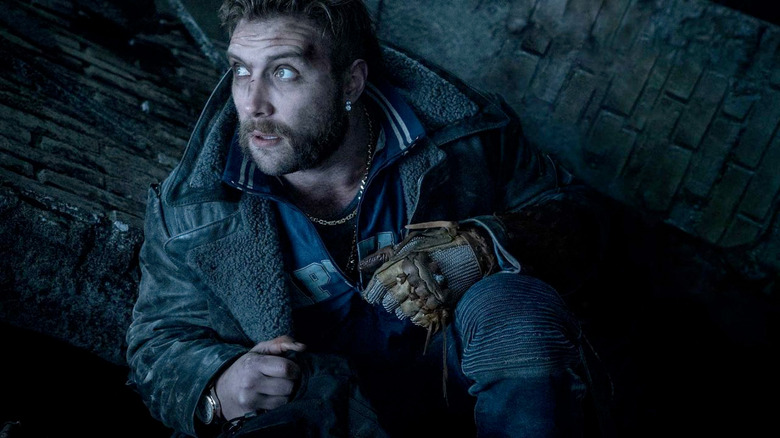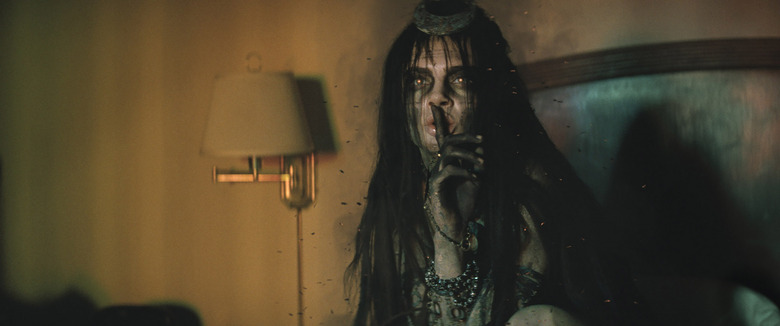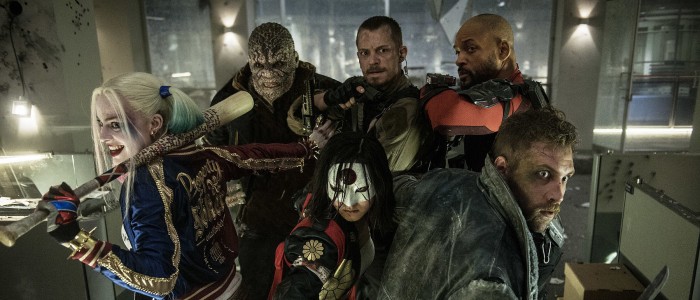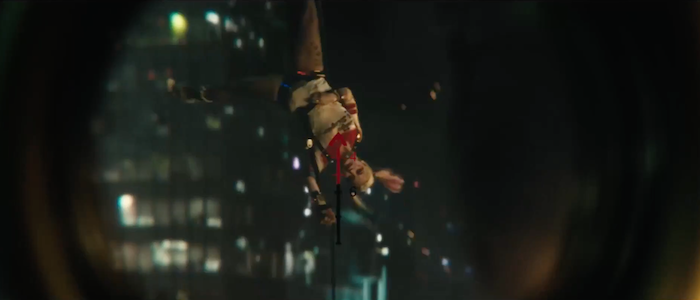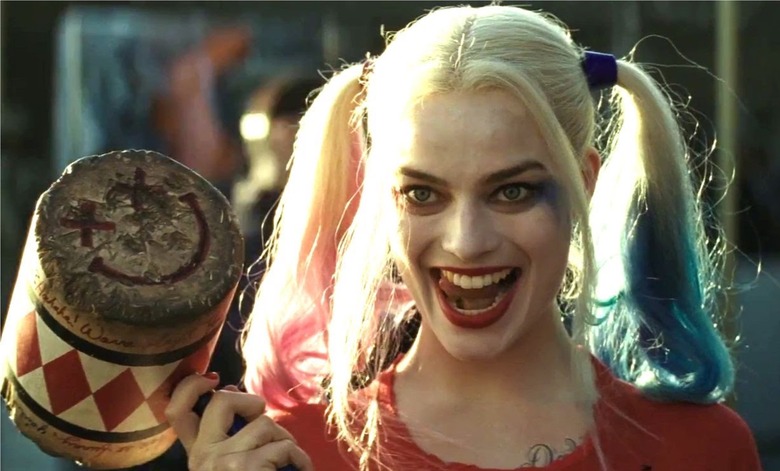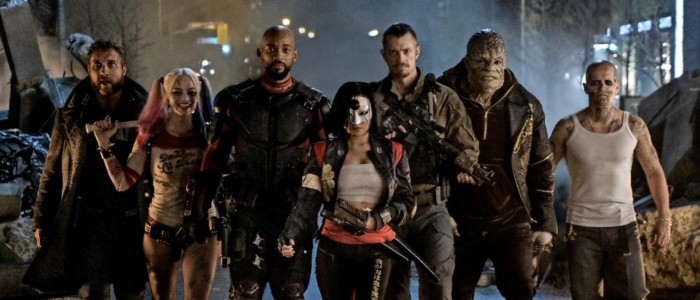'Suicide Squad' Spoiler Review: An Autopsy Of One Very Strange Misfire
Based on its massive box office over the weekend, chances are strong that you've seen David Ayer's Suicide Squad. And based on how everyone is screaming about it, chances are just as strong that you have an opinion about it.
I'm not sure what to make of Suicide Squad, a movie that feels compromised from frame one, constantly confused about what it wants to be. I'm not sure if its uglier elements are intentional or the result of too many cooks not seeing the forest for the trees. I'm not sure we'll ever know exactly what went wrong here until someone from the production decides to speak up in the future. Because right now, this is a baffling misfire of a movie with a few interesting highlights.
You've Got to Take the Good...
Will Smith and Margot Robbie are movie stars.
For Smith, that's literal – there's a reason he's one of the most famous faces in the world. Suicide Squad is a reminder that natural onscreen charisma isn't something you can fake and no number of questionable editing choices or questionable character beats can take away his natural magnetism. When the camera is turned in the general direction of Floyd Lawton, AKA Deadshot, the man who never misses, you pay attention. Smith is so innately watchable that you can forgive the softening of this character to fit better into a familiar mold. Yes, Deadshot kills people for a living, but he doesn't kill women or children! He loves his daughter! He's got a heart of gold! I don't know if these details were added before or after Smith was cast in the part, but they allow Smith to play to his strengths as the Inherently Likable Wiseass Who Ultimately Does The Right Thing. And it works, because Deadshot is one of the few characters I decided I wanted to see again when the credits rolled.
Margot Robbie's movie stardom is bit more theoretical at this point. Her name and face won't open movies yet, but she's getting there and Suicide Squad provides the latest pile of evidence. However, she's got the same thing that Will Smith has, that natural comfort on camera that makes her watchable in even the direst of scenes. There are severe problems with the character of Harley Quinn (and we'll address them in a bit), but none of those issues can be laid at the feet of Robbie, whose spirited performance is wickedly funny and weird and sad. Even when the script lets her down, Robbie feels like ideal casting for the role of the Joker's girlfriend. Creating an instantly likable sociopath is no easy task (just ask some of her co-stars) and she pulls it off with aplomb.
The third performance to celebrate in Suicide Squad is Viola Davis as Amanda Waller, who takes one the DC universe's great, unsung villains and brings her to the big screen with everything that made her great on the page intact. In a comic book landscape filled with evil clowns and crocodile men, Waller somehow measures up to the worst of the worst, wielding bureaucracy like Harley wields a blunt object. Davis' firm, no-nonsense performance provides the foundation upon which the rest of the movie's silliness can flourish. A great deal of that silliness doesn't quite work, but it's easy to imagine her playing the "straight man" to the increasingly colorful DC Extended Universe moving forward.
...With the Forgettable...
One of the big problems with Suicide Squad is that it frequently neglects its ensemble. While Smith, Robbie, and Davis are allowed to own the screen, the rest of the team is frequently shuffled off into the margins, only occasionally emerging to do, well, anything at all.
As straight-arrow team leader Rick Flag, Joel Kinnaman is a genuine snooze, doing the same job as Amanda Waller (a foil to the rest of the team) while being significantly less interesting. His motivation – he just wants his girl back – is a borderline unforgivable cliche and Kinnaman doesn't have the Will Smith-level charisma to make us care about a storyline this obvious.
Other characters simply suffer from never getting anything interesting to do. Jai Courtney's Captain Boomerang feels like he was supposed to act as the comic relief of the film, but his time on screen is limited at best. When he is on screen, the movie never justifies why this guy would be recruited alongside these far more talented psychopaths. Rather than play up his bizarre skill set and find new ways to make boomerang efficiency feel deadly and unique, he's portrayed as just another brawler. The same goes for Adewale Akinnuoye-Agbaje's Killer Croc, who is ultimately just a waste of some killer practical prosthetics – he adds nothing to the story and his contribution to the various action scenes comes down to him just punch things. Jay Hernandez's El Diablo comes the closest to being interesting (he has an actual arc and everything!), but even he is sidelined for much of the film, with his backstory spilling out just in time for his big act three death.
Most damning of all is Jared Leto's Joker, not because it's a bad performance, but because I honestly couldn't tell you if it was bad or not. I can't tell you if it's good, either. Remember how Jack Nicholson's Joker was introduced by him slowly stepping out of the shadows and into the light? Or how Heath Ledger ripped off that clown mask in leaned in for a giant, IMAX-sized close-up? Leto's Joker never gets a proper introduction and that's indicative of how the rest of the film treats him. Ayer is playing with an icon here, reinventing one of the most famous villains in all of pop culture, and none of his scenes carry any weight or ultimately matter to the story. He's just another crazy guy in a movie full of 'em. There is no definitive Joker scene, no moment that establishes why this guy is so terrifying and why this guy is the arch-enemy of Batman. Rather than leave me wanting to see the Joker face off against the Dark Knight in a future movie, Suicide Squad left me not knowing the new Joker at all.
...and the Worst
Enchantress and Incubus are the worst comic book movie villains of all time. Full-stop. At least we know what the endlessly dull Malekith from Thor: The Dark World wants. At least Arnold Schwarzenegger's Mr. Freeze is a campy hoot to watch and quote. At least Jesse Eisenberg's Lex Luthor was weird enough to create conversation and at least Doomsday felt like a world-threatening force of nature (even thought he looked like a big pile of troll poop). These two want to destroy humanity just because. They spend the entire movie hanging out around a giant sky portal just because. While Enchantress is embarrassing because she spends the bulk of her screen time gyrating in front of an ill-defined "weapon," Incubus is a debacle on every level, a CGI creation who gave me flashbacks to the Scorpion King from The Mummy Returns. He is the first special effects character in over a decade that made me want to crawl under my seat because I was so embarrassed for the movie I was watching.
The good guys don't get out of this. Karen Fukuhara's Katana is also an outright disaster, a character who feels shoehorned into the story for no reason other than the studio wanting to squeeze as many vaguely recognizable characters into the film as possible. Cut her from the movie and nothing changes. If she once did anything important, it's no longer in the film. She has no memorable interactions with the cast. She has no memorable action beats. She's a non-entity in a cool mask.
What Is This Movie?
The first serious red flag arrives early in Suicide Squad when the characters are introduced via a series of colorful graphics that display their names and their various attributes and abilities. The second red flag takes a few extra minutes to reveal itself. It arrives once you realize that the barrage of instantly recognizable rock and pop songs simply isn't going to stop and that they are going to arrive one after another after another after another like a jukebox from hell.
These choices go hand-in-hand and reflect the biggest issue facing Suicide Squad at nearly every turn: the whole thing is trying way too hard. In fact, the whole thing may be trying way too hard to emulate Guardians of the Galaxy, which also featured memorable music cues and also provided backstory for its cast via onscreen text (albeit through in-universe Nova Corps rap sheets). Suicide Squad wants to be offbeat and cool, the off-kilter cousin with the motorcycle and the extensive vinyl collection to the core DC universe, but you quickly realize that that the motorcycle is just for show and that it can't actually name the members of the bands it claims to love. The soundtrack, those graphics, feel like desperate attempts to transform one movie into another.
Every film deserves to be watched in a vacuum, but it's hard to do that with Suicide Squad, whose production difficulties have become public knowledge in the past week. Once you know the tales of dueling edits and studio-mandated reshoots, you can see the scars on the film itself. You can see the movie David Ayer wanted to make and the movie that Warner Bros. ended up stitching together like a Frankenstein's Monster. Perhaps the reason Suicide Squad feels like a desperate attempt to recreate the bizarro charms of Guardians of the Galaxy is because those trailers reminded so many people of James Gunn's superhero space opera. And those trailers were really, really good. And David Ayer doesn't typically make movies that feel like those trailers.
You can feel Ayer's hand at work here. His characters are brutes with chips on their shoulders. Ugly testosterone is at the forefront of virtually every character. There's a nastiness in every frame that easily recalls his work in Fury and Sabotage. But you can also feel an external force, the one coating Ayer's trademark grimness with memorable pop songs and slapping aggressively silly graphics over character introductions and inserting a cameo from Ezra Miller's the Flash and expecting us to lap it up even though we haven't been given a reason to actually care about the Flash in any way yet. Suicide Squad is a movie at war with itself, a project torn between two very different visions, and it never knows what it wants to be.
The Helicopter Problem
Three helicopters crash in Suicide Squad. Specifically, there are three separate scenes where different helicopters carrying main characters are shot out of the sky and crash. That also means that there are three separate scenes where the important characters in each helicopter come out of the wreckage unscathed. Two of these incidents literally occur one right after the other, with different characters surviving chopper crashes within five minutes of each other. It feels like a running joke that no one wants to acknowledge. It also feels like a microcosm for everything that is wrong with how this movie is structured and paced.
If everyone thought it was okay to feature three separate helicopter crashes that are identical in every way that matters, it becomes easier to understand why the first 45 minutes of Suicide Squad are composed entirely of character introductions, with several characters being introduced more than once. Take Deadshot, who we meet in the very first scene of the movie, looking despondent in his prison cell. He is reintroduced in a flashback not ten minutes later. Ten minutes after that, he is introduced once more at his "audition" for the team, where the skills we saw on display in the flashback are shown off once again. We don't need to meet Deadshot three times, but we do. He's the worst offender, but this applies to other members of the ensemble as well.
And then the movie has the audacity to keep those introductions coming. We don't meet Adam Beach's Slipknot or Katana until nearly an hour into the movie, where they arrive with no fanfare and proceed to do little of consequence. In Suicide Squad, characters are either continuous reintroduced or they're not introduced properly at all. There's no real structure here, no sense of pacing or of one thing leading to another. The movie opens with wheel-spinning and the drops us into an extended third act. The news that the movie has been apparently chopped into ribbons could go a long way to explaining what went wrong, but the effect is deeply unpleasant. After awhile, Suicide Squad begins to feel like a collection of scenes rather than a story, with the edit limping from event to event with no rhyme or reason for one event leading to another.
The Harley Quinn Problem
That brings us to the elephant in the room and an issue that both Jen Yamato at The Daily Beast and Alison Willmore at Buzzfeed have both eloquently written about. It's hard to ignore the sexist and misogynist undertones of Suicide Squad.
Harley Quinn is the central issue here and it goes beyond her ridiculous outfit with those ridiculous shorts. Perhaps the biggest mistake Suicide Squad makes is that it chooses to frame that relationship between the Joker and Harley as a love story, never pausing to acknowledge that she is a victim of an abuser and a monster. This is especially strange because Harley's longevity as a character, the reason she has become so popular in recent years, is due to her rejecting "Mistah J" and becoming her own woman. Harley Quinn isn't beloved because she's the Joker's girlfriend – she's beloved because she escapes from him. She defeats her abuser.
So the fact that Suicide Squad concludes with the Joker triumphantly breaking her out of prison is grotesque. The fact that her torture at his hands is depicted as the act of a devoted lover is unpleasant in all of the wrong ways. It's a fucked-up dynamic by design, but the film's refusal to give Harley growth, to let her recognize this, is cowardly at best and loathsome at worst. It fails to understand the chief appeal of the character, reducing her to a brainwashed victim from beginning to end. Margot Robbie, and Harley Quinn, deserve better than this.
But Harley is the tip of the iceberg here. The sexist jabs, the ugly moments, pile up quickly. Taken individually, they are forgivable, the words and actions of bad people living in an ugly world. By the time Slipknot is introduced punching a woman in the face for no apparent reason, things have bubbled over into deeply uncomfortable territory. There has simply been too much violence toward women, too many derogatory comments, and too much generally sexist nastiness to ignore. If nothing else, Suicide Squad has me primed for that Wonder Woman movie – something has to wash this taste out of my brain.
The State of the DC Extended Universe
So here we are, three movies into the DC Extended Universe and no one appears to be steering the ship. Rather than feel like a course correction from the awful (but far more dedicated to its weirdo ideas) Batman v Superman: Dawn of Justice, Suicide Squad is a bad movie in completely different ways. Batman v Superman felt like the wrong artist at the helm of the wrong ship. Suicide Squad feels like a mutiny.
By my very nature, I want to love these movies. I say that as someone who still likes Man of Steel quite a bit. I say that as someone who reads superhero comics every week and loves these characters. I want these movies to be good. Nothing would make me happier than to see Harley Quinn and Deadshot and Killer Croc on screen in movies that I enjoy. I don't buy the nonsense being spouted from the dark corners of DC fandom, where anyone who speaks ill of these movies is a hater. I'm not a hater – I'm a lover, pure and simple. I love these characters and the DC universe too much to settle for movies like this.
And because of that, I look ahead to Wonder Woman and want it to be good. I can't help but have faith in Justice League. I want Warner Bros. to get their act together. I eagerly await the day when I can take a positive deep dive on a movie from the DCEU. Nothing would make me happier.

